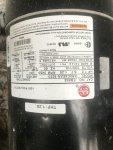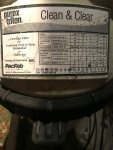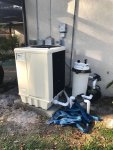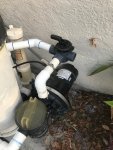Hello all, I’ve got a brand new Pentair Heat Pump (Ultratemp 110) that I’ve got hooked up and is operating and heating the pool; however, when the pool pump is on and the heat pump is off, there is a consistent knocking noise coming from within the plumbing of the heat pump. Has anyone ever experienced anything similar to this?
My pool pump is a single speed pump and seems to really move a lot of water through the lines quickly, pressure on the filter is typically around 18-20 psi even when the cartridge is clean. Suction and return lines are 1.5” and the pump is listed as 1.25 THP. Pool is kidney shaped, about 3.5 feet shallow end and just over 6 feet deep end. I believe total gallons are somewhere around 12k-14k. Any advice to remediate this would be greatly appreciated. (I’m thinking my pump is oversized).
My pool pump is a single speed pump and seems to really move a lot of water through the lines quickly, pressure on the filter is typically around 18-20 psi even when the cartridge is clean. Suction and return lines are 1.5” and the pump is listed as 1.25 THP. Pool is kidney shaped, about 3.5 feet shallow end and just over 6 feet deep end. I believe total gallons are somewhere around 12k-14k. Any advice to remediate this would be greatly appreciated. (I’m thinking my pump is oversized).





